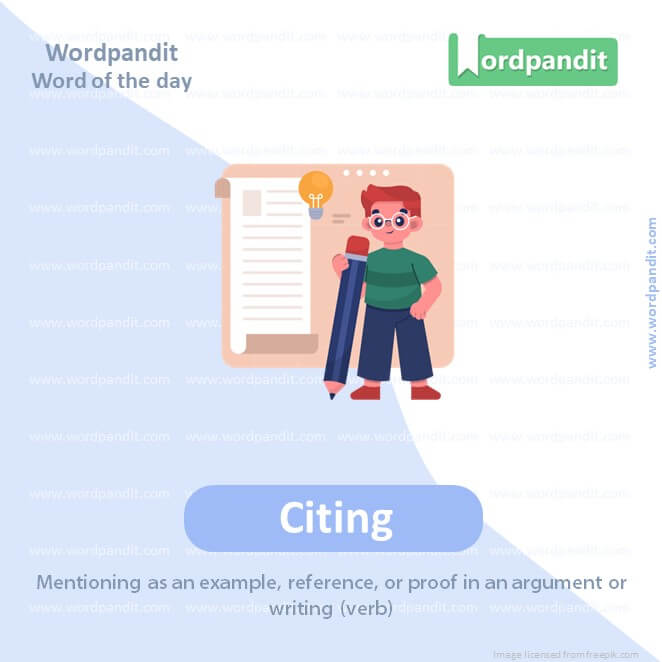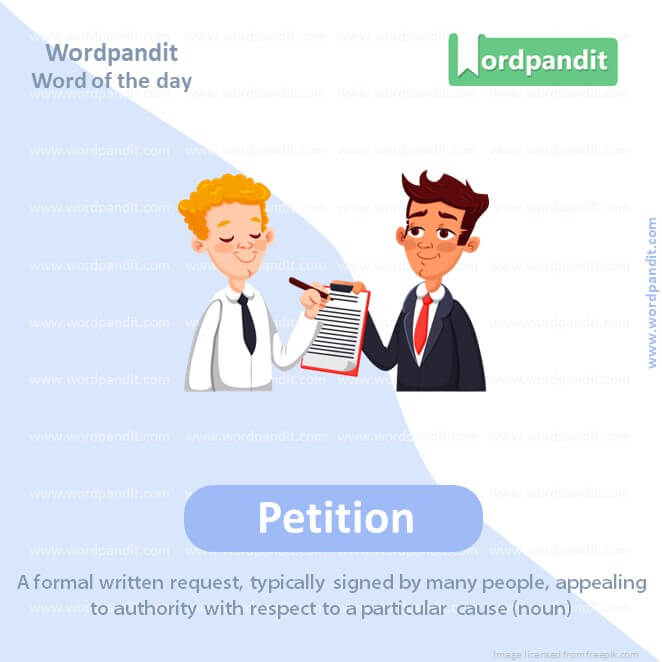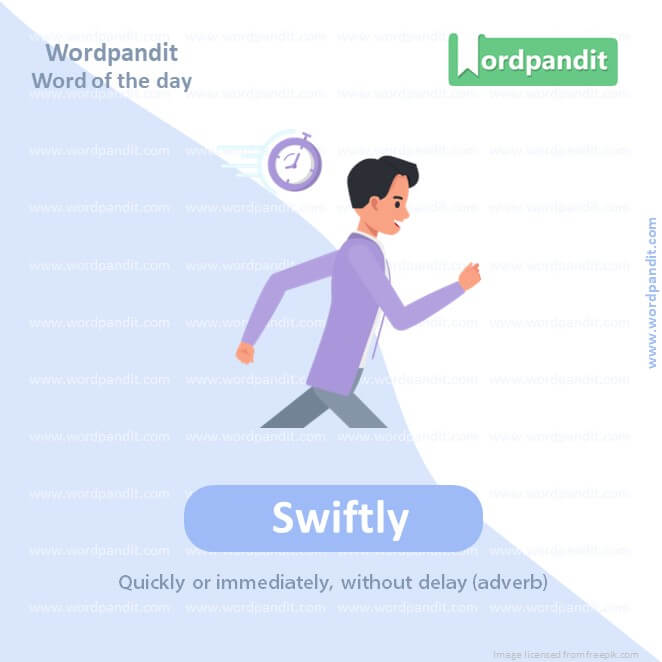Daily Vocabulary Words: List of Daily Used Words
Hi there. Welcome to this special section @ Wordpandit.
Our endeavour here is straightforward: highlighting important daily vocabulary words, you would encounter in The Hindu. This is your repository of commonly used words; essentially, we are posting a list of daily used words. Hence, this has significant practical application as it teaches you words that are commonly used in a leading publication such as The Hindu.
Visit the website daily to learn words from The Hindu.
WORD-1: Adhered
CONTEXT: Prima facie, it has been found that the standard operating procedures were probably not adhered to by the commandos, they said.
SOURCE: The Hindu
EXPLANATORY PARAGRAPH: “Adhered” is like sticking to something or following a rule very closely. It’s like when you stick a sticker to a paper and it stays there, or when you follow the rules of a game exactly.
MEANING: Stuck fast to something; followed or obeyed a set of rules or beliefs closely (verb).
PRONUNCIATION: uh-HEERD
SYNONYMS: Clung, Stuck, Abided by, Complied with, Held to
USAGE EXAMPLES:
1. The poster adhered to the wall.
2. She adhered to the school’s rules.
3. The glue made the paper adhere to the surface.
4. He adhered strictly to his diet.

WORD-2: Convoy
CONTEXT: A police complaint was filed on Wednesday by Vishwas’ security alleging that his vehicle was hit by a car driven by a man who also “attacked” the CRPF and police personnel moving in the convoy of the poet.
SOURCE: The Hindu
EXPLANATORY PARAGRAPH: “Convoy” is like a group of vehicles or ships that travel together. It’s like when you see a line of cars or trucks on the road going to the same place, one after the other.
MEANING: A group of vehicles or ships traveling together, often for protection (noun).
PRONUNCIATION: KON-voy
SYNONYMS: Caravan, Fleet, Motorcade, Escort, Procession
USAGE EXAMPLES:
1. The trucks traveled in a convoy for safety.
2. A naval convoy transported the goods.
3. The president’s convoy passed through the city.
4. The convoy of aid trucks reached the disaster area.

WORD-3: Citing
CONTEXT: “That particular passage or statement within the citing document containing the references”
SOURCE: The Hindu
EXPLANATORY PARAGRAPH: “Citing” is like mentioning something as an example or as proof of something. It’s like when you tell your friend about a story from a book to explain your idea.
MEANING: Mentioning as an example, reference, or proof in an argument or writing (verb).
PRONUNCIATION: SY-ting
SYNONYMS: Quoting, Referencing, Mentioning, Alluding to, Acknowledging
USAGE EXAMPLES:
1. She was citing a famous author in her essay.
2. The lawyer cited several cases in his argument.
3. Citing reliable sources is important in research.
4. He enjoyed citing facts in discussions.
WORD-4: Contravened
CONTEXT: Moreover, non-availability of spare parts contravened the right to repair of each customer, while the firm suggested the purchase of an alternative fridge at higher cost.
SOURCE: The Hindu
EXPLANATORY PARAGRAPH: “Contravened” means to do something that is not allowed or breaks a rule. It’s like when you play a game and someone does something that the rules say you shouldn’t do.
MEANING: Went against or acted contrary to a law, rule, or agreement (verb).
PRONUNCIATION: kon-truh-VEEND
SYNONYMS: Violated, Infringed, Disobeyed, Breached, Defied
USAGE EXAMPLES:
1. The company contravened the new regulations.
2. His actions contravened the school’s policies.
3. By parking there, she contravened the traffic laws.
4. The agreement was contravened by both parties.

WORD-5: Petition
CONTEXT: The Tamil Nadu government on October 31 moved a writ petition in the Supreme Court against Governor Ravi for creating a “constitutional deadlock” by inexplicably delaying or even failing to consider and assent to crucial Bills passed by the Legislature and stymieing day-to-day governance in a way which is threatening to bring administration in the State to a grinding halt.
SOURCE: The Hindu
EXPLANATORY PARAGRAPH: “Petition” is like asking someone who can make decisions, like a teacher or a president, to do something or change something, often by writing down what you want. It’s like making a special request.
MEANING: A formal written request, typically signed by many people, appealing to authority with respect to a particular cause (noun).
PRONUNCIATION: puh-TISH-uhn
SYNONYMS: Appeal, Request, Plea, Application, Entreaty
USAGE EXAMPLES:
1. They started a petition for a new playground.
2. The petition was signed by hundreds of people.
3. She filed a petition to change the law.
4. The online petition gained thousands of signatures.

WORD-6: Curriculum
CONTEXT: When the petitioner referred to the educational curriculum, the bench said it was for the government to lay down the curriculum.
SOURCE: The Hindu
EXPLANATORY PARAGRAPH: “Curriculum” is all the things you learn about in school, like math, science, and reading. It’s like a big list of everything teachers teach you during the school year.
MEANING: The subjects comprising a course of study in a school or college (noun).
PRONUNCIATION: kuh-RIK-yuh-lum
SYNONYMS: Syllabus,
Course of study, Program, Educational program, Schoolwork
USAGE EXAMPLES:
1. The school introduced a new curriculum.
2. Math is part of the school’s curriculum.
3. They are revising the college curriculum.
4. The curriculum includes both science and art.

WORD-7: Swiftly
CONTEXT: U.S. Secretary of State Antony Blinken had warned Israel last week that it risked destroying an eventual possibility for peace unless it acted swiftly to improve humanitarian conditions in Gaza for Palestinian civilians as it intensifies its war against Hamas.
SOURCE: The Hindu
EXPLANATORY PARAGRAPH: “Swiftly” means doing something really fast or quick. It’s like when you run as fast as you can to get to the playground.
MEANING: Quickly or immediately, without delay (adverb).
PRONUNCIATION: SWIFT-lee
SYNONYMS: Quickly, Rapidly, Speedily, Promptly, Briskly
USAGE EXAMPLES:
1. She moved swiftly to finish the task.
2. The bird flew swiftly through the sky.
3. He responded swiftly to the email.
4. The car drove swiftly down the road.
WORD-8: Incumbent
CONTEXT: Although the term most commonly refers to the person who holds a position in the office of a company or a government organization and is held responsible for that position, it may also refer to the responsibility itself.
SOURCE: The Hindu
EXPLANATORY PARAGRAPH: “Incumbent” is a person who has a certain job, especially an important one, right now. It’s like the current teacher in your classroom.
MEANING: Currently holding a specified office (adjective); necessary as a duty or responsibility (noun).
PRONUNCIATION: in-KUHM-buhnt
SYNONYMS: Current holder, Officeholder, Obligatory, Required, Necessary
USAGE EXAMPLES:
1. The incumbent president gave a speech.
2. It’s incumbent on us to help others.
3. The incumbent mayor was re-elected.
4. He faced a challenge from the incumbent.
WORD-9: Morphed
CONTEXT: Thakur praised Mandanna for speaking up and urged people to not be silent spectators as morphed videos of female actors float around on the internet zooming inappropriately on body parts.
SOURCE: The Hindu
EXPLANATORY PARAGRAPH: “Morphed” means to change shape or form into something different. It’s like when a caterpillar turns into a butterfly.
MEANING: Changed smoothly from one image or form to another (verb).
PRONUNCIATION: MORFT
SYNONYMS: Transformed, Converted, Altered, Metamorphosed, Evolved
USAGE EXAMPLES:
1. The caterpillar morphed into a butterfly.
2. The story morphed as it was told by different people.
3. The character morphed into a hero by the end of the movie.
4. The software can morph one face into another.
WORD-10: Disheartening
CONTEXT: Chaitanya said it was disheartening to see how technology is being misused and the thought of what this can progress to in the future is even scarier.
SOURCE: The Hindu
EXPLANATORY PARAGRAPH: “Disheartening” is when something makes you feel sad or like you want to give up. It’s like when you try really hard at something but it doesn’t work out, and you feel a little sad about it.
MEANING: Causing someone to lose determination or confidence; discouraging (adjective).
PRONUNCIATION: dis-HAR-tuh-ning
SYNONYMS: Discouraging, Depressing, Dismaying, Demoralizing, Saddening
USAGE EXAMPLES:
1. The news was disheartening to hear.
2. It’s disheartening when your hard work doesn’t pay off.
3. The team found the loss disheartening.
4. Despite the disheartening results, they persevered.
vocabulary NDA
Understanding the Vocabulary NDA (Non-disclosure Agreement) is a crucial step in the world of business and law. These terms are not just a compilation of complex words, but a key to decoding legal implications that could affect your business.
Essentially, the Vocabulary NDA refers to the specific set of terms and phrases typically present in a non-disclosure agreement. Broadening your knowledge on this could significantly enhance your comprehension, allowing you to navigate the legal landscape more smoothly.
Mastering the vocabulary NDA starts by contextualizing. While it may sound highly technical, relating each term to real-world scenarios greatly facilitates one’s learning process. Realize that the words in the vocabulary NDA are not arbitrary; they align with certain legal concepts, circumstances, and proceedings.
Secondly, repetition plays an integral role. Regular exposure to the vocabulary NDA strengthens one’s memory, promoting the retention of information. Consider engaging in relevant discussions, reading articles, listening to podcasts, or even simply reviewing a non-disclosure agreement. This repetitive interaction ultimately ingrains the vocabulary NDA into one’s cognitive system.
The vocabulary NDA becomes less intimidating through practical application. It’s essential to apply these terms in actual situations – be it drafting your own NDA, or merely examining an existing one. This invites an in-depth understanding, making the vocabulary NDA more familiar and comprehensible.
Lastly, remember to continuously expand and refine the vocabulary NDA. Legal terminologies evolve, and so should your lexical prowess. Stay updated with new terms and modifications in law that could modify the existing vocabulary NDA.
To sum it up, learning the vocabulary NDA requires relatability, repetition, practical application, and continuous learning. Leverage these strategies, and break your barriers to legal fluency. Unfurl the complexities of the vocabulary NDA, for it’s a secret tool in your success arsenal.











